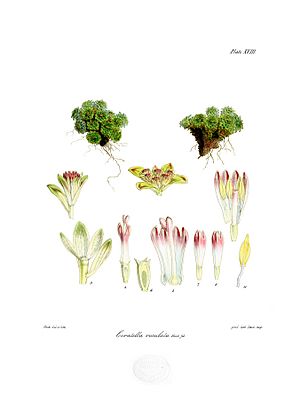Abrotanella rosulata facts for kids
Quick facts for kids Abrotanella rosulata |
|
|---|---|
 |
|
| Conservation status | |
|
Invalid status (NZ TCS)
|
|
| Scientific classification |
|
| Kingdom: | Plantae |
| Clade: | Tracheophytes |
| Clade: | Angiosperms |
| Clade: | Eudicots |
| Clade: | Asterids |
| Order: | Asterales |
| Family: | Asteraceae |
| Genus: | Abrotanella |
| Species: |
A. rosulata
|
| Binomial name | |
| Abrotanella rosulata (Hook.f.) Hook.f.
|
|
| Script error: The function "autoWithCaption" does not exist. | |
| Synonyms | |
|
Ceratella rosulata Hook.f. |
|
Script error: No such module "Check for conflicting parameters".
Abrotanella rosulata is a unique plant. It belongs to the Asteraceae family, which includes daisies. You can only find this special plant on the Campbell Islands. These islands are far away in the southern Pacific Ocean.
Contents
What Does Abrotanella rosulata Look Like?
This plant is quite small. It grows in dense clumps, looking a bit like moss. Its stems are usually about 2.5 to 3.8 centimeters (1 to 1.5 inches) tall.
Leaves and Flowers
The leaves of Abrotanella rosulata overlap each other. They are stiff and feel like leather. Each leaf is about 0.6 to 0.8 centimeters (0.25 to 0.33 inches) long. They are narrow, pointed, and curve slightly inwards.
The plant's tiny flowers grow in groups. You can find these flower heads among the upper leaves. Each flower head is very small, only about 0.25 centimeters (0.1 inches) long. They have 8 to 10 protective scales that are tough and have clear veins.
The male flowers have a four-sided shape. The female flowers are tube-shaped and have four small teeth. After flowering, the plant produces a four-sided seed, called an achene.
How This Plant Got Its Name
This plant was first described in 1844. A famous botanist named Joseph Dalton Hooker discovered it. He found it on the Campbell Islands. He saw it growing in cracks in rocks on top of mountains, about 427 meters (1,400 feet) high.
Changing Names
When Hooker first described the plant, he named it Ceratella rosulata. But later, in 1864, he changed its genus. He decided it belonged in the Abrotanella group instead. So, its official name became Abrotanella rosulata.
Why This Plant Needs Protection
Abrotanella rosulata is considered "At Risk - Naturally Uncommon." This status comes from the New Zealand Threat Classification System.
What "Naturally Uncommon" Means
Being "Naturally Uncommon" means that this plant is not found in many places. It only grows in a small area on the Campbell Islands. Because its home is so small, it is more vulnerable. Its status has remained the same since 2009. This shows how important it is to protect its natural habitat.
 | Selma Burke |
 | Pauline Powell Burns |
 | Frederick J. Brown |
 | Robert Blackburn |

